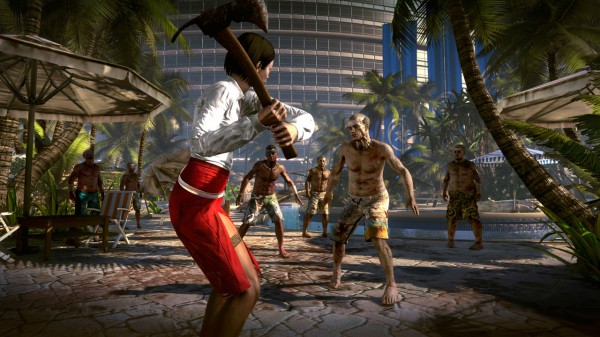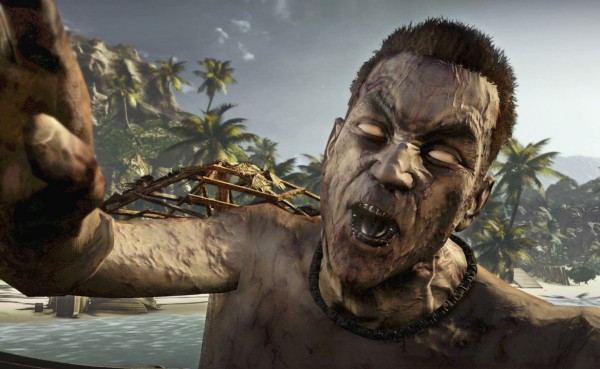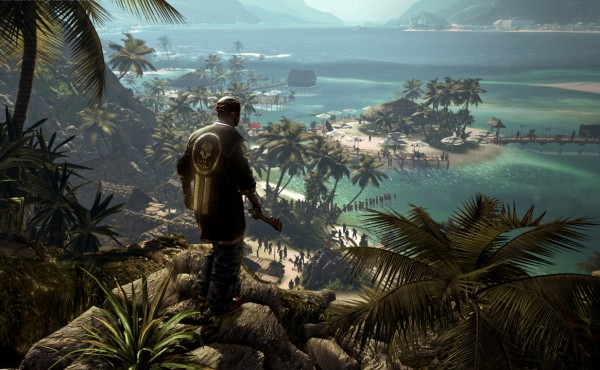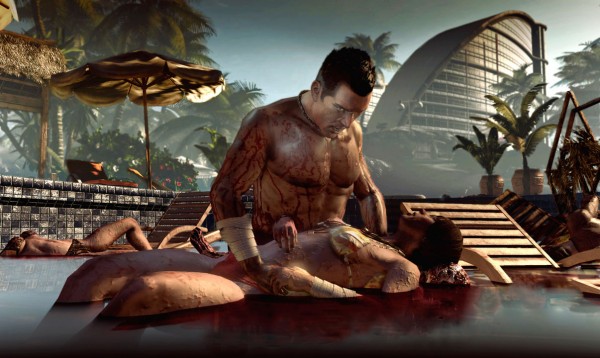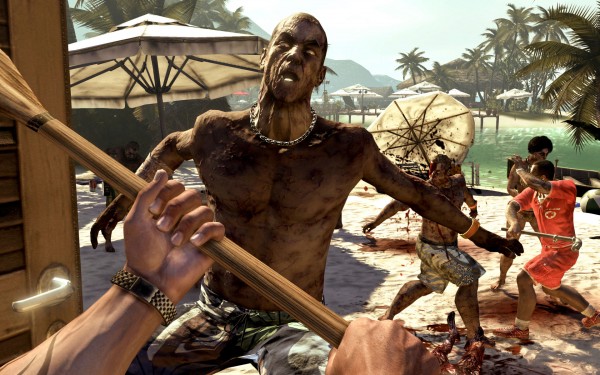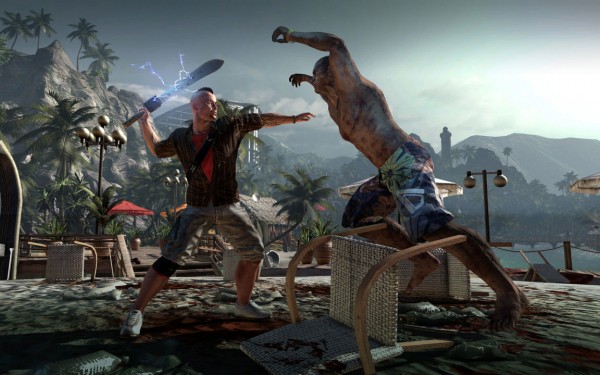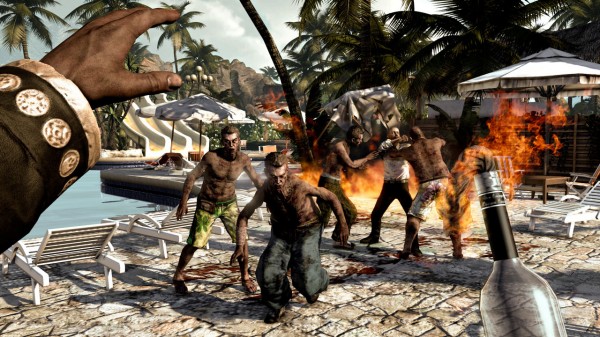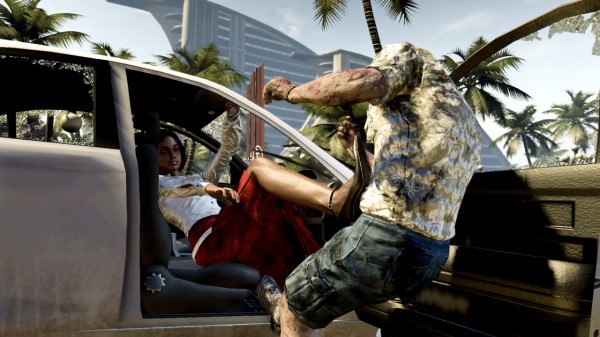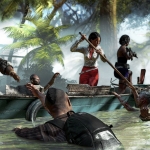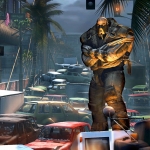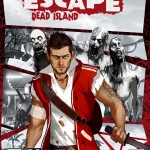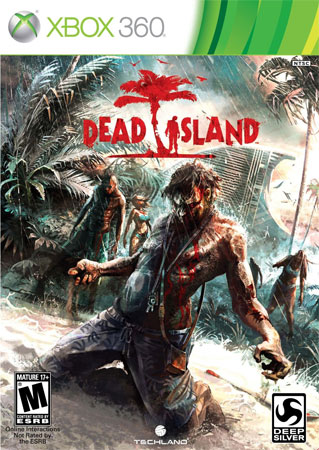
Earlier this year, game publisher Deep Silver dominated the Internet hype machine when they unleashed their intensely emotional and artistically produced teaser trailer for Dead Island, their upcoming zombie survival game. It seemed doubtful that the final game could meet the high expectations set by the short CGI movie, but as details began to trickle out about Dead Island, a new sort of excitement started building, this time around the actual game mechanics. Now that the game is in stores, I’ve had a chance to slaughter many an undead creep, and I can say with certainty that Techland and Deep Silver have produced a solid, deep, and enormous game that never forgets to be fun.
The zombie game genre has become quite crowded over the last few years as players have made their way through malls and casinos in the Dead Rising series, gone on killing sprees with their friends in the Left 4 Dead games, and tangled with uniquely bizarre zombies in the Resident Evil franchise. With so many different sorts of zombie games, as well as a flood of open world action-RPGs such as Borderlands, the Fallout games, and Farcry 2, it’s hard to imagine something that hasn’t already been done well in that arena. That’s why much of Dead Island feels familiar. It lovingly borrows some of the best elements of all of those previous games without appreciably changing the overall formula. Its uniqueness comes in the ingenious ways in which it combines those elements to make a game that, while similar to its predecessors, is a far different and deeper experience than we’ve seen.
The titular island is Banoi, a tropical resort island in the South Pacific. In the midst of the holiday season, a mysterious plague descends upon the vacationers and residents, transforming the once lush paradise into a hotbed teeming with the murderous undead. As if that were not bad enough, a monsoon is on the way, intent on further ruining the day. You step into the shoes of one of the four people on the island who somehow are immune to the zombie infection. Each of the four characters has a unique backstory and personality, as well as a particular area of fighting expertise. Purna, a former Australian cop, is a firearms expert who can regenerate and repair damage. Logan, a disgraced former pro athlete, is adept at targeting and throwing. Sam B, a fading rap star, is the brawler and weilds blunt weapons well. Xian Mei, a resort employee, harnesses martial arts and bladed weapons. Once you’ve chosen your character you’re dropped into the midst of the island’s mayhem.
Dead Island plays marvelously as a single player open world action-RPG in the vein of Borderlands, but, again like Borderlands, you can team up with three other friends for co-op play. All four players in the co-op get to use their own characters from their individual playthroughs, so it’s entirely possible to get a whole team full of one character. The co-op works well, regardless of which team you assemble, though it is fun to see all four different folks working together to beat down the zombies. Dead Island‘s co-op matchmaking works well, too. As you play through the game on your own, you’ll occasionally see a pop-up to alert you that another player is nearby in his or her own game, and it gives you the option to jump into that game to join them. The game does a good job of not pairing you unevenly, so you’ll always join up with someone who is near your character on the map, in level, and in story progression.
Being an open world game with a strong RPG backbone, Dead Island really delivers on the character progression and development front. You’ll accumulate experience points through combat and through completing missions you pick up from the island’s denizens. Missions usually are of the “go get this thing and bring it back to me” variety, but there is some really cool occasional diversity that will task you with multiple checkpoint missions that require you to do series of complex tasks. All that experience accumulates to level you up in standard roleplaying game format. Each time you hit a new level, your overall character stats increase, and you also get the option to unlock one new ability. The unlockable abilities are set up in trees that will look familiar to players of World of Warcraft, Rift, and any number of other MMOs that function on tree progression. The trees available to you differ from character to character. Xian Mei has bladed abilities and martial arts perks available to her, while Sam B has unarmed and blunt perks in his trees, for example. All the characters get a general Survival tree that will let you unlock things like larger inventory capacities and better stamina regeneration. The character leveling is fast and satisfying and makes the overall game even more addictive than it already would have been.
All that progression would be for naught if the core of the game, namely beating the snot out of loads of zombies, were not fun. Thankfully, Dead Island has some of the most satisfying first person combat I’ve experienced. Much of that comes from the game’s focus on melee fighting, as opposed to relying on firearms like many games in the genre do. Hitting the bad guys with cleavers, baseball bats, and lead pipes looks and feels awesome. The whole game is gorgeous, but zombie combat damage is especially gruesomely well done, as cuts and smashes show up where you pound on the zombies, and undead skin sloughs away to reveal all the grotesque viscera you could want from a horror game like this. The real star in the game’s melee combat is the secondary melee mode that actually is a little bit hidden. By default, you can swing your weapon of choice with the right trigger. If you go into the Options menu, however, you can change the combat mode to Analog for a much more precise and satisfying control scheme. With analog controls turned on, you’ll prepare your attack by holding the left trigger, and then you’ll actually swing your weapon by pulling the right thumbstick for your backswing and following through by pushing it forward again. The angle of attack with the thumbstick matters, as you’re able to break arms and even sever limbs with well placed blows, both of which will impede the baddie’s ability to do you harm.
The strategic combat element carries over into your weapons as well. Dead Island‘s open world is a very interactive one, in which you can pick up tons of different random items and use them as weapons. From the start you’ll find things like boat paddles and kitchen knives, but as you progress farther into the game you’ll start encountering more elaborate and devastating tools of zombie ruination. This might sound similar to the way Dead Rising handles weapons, and it is, even down to weapon degradation over time and use. Dead Island also provides you with workbenches like the ones in Dead Rising 2, where you can combine things you’ve picked up to make new and even better weapons. Dead Island goes a few steps farther than its predecessor, though, by giving you the ability to repair damaged weapons at the workbench, as well as to modify and enhance the weapons you’re holding, which is a different thing than combining and building new ones.
You’ll spend money to repair and upgrade your weapons to improve their durability and damage potential, and you’ll need collectable blueprints to build new gear. While Dead Rising 2 has you combining things like oars and chainsaws with duct tape to make ridiculously over the top weapons, Dead Island makes the process a little more believable and grounded. You can still end up with fairly ridiculous killing sticks, but they come together in more reasonable ways. Bolts, batteries, string, and diamonds are among the loads of component parts you’re able to loot throughout the game, and they come together at the workbench to complete blueprint recipes for things like deo-bombs (explosives made from deodorant cans) and blazing bats (eternally flaming baseball bats that do fire damage, as well as act as torches to light dark areas).
Dead Island truly is an enormous game with lots and lots of quests, collectibles, and exploration, and it will keep you busy and entertained for far longer than you probably expect that it would. It’s incredible that any title would be able to reinvigorate an intensely overly saturated market like zombie games, much less a title coming from a smaller developer like Techland. Nevertheless, they really have delivered the goods, and it looks like they have a solid hit on their hands.


